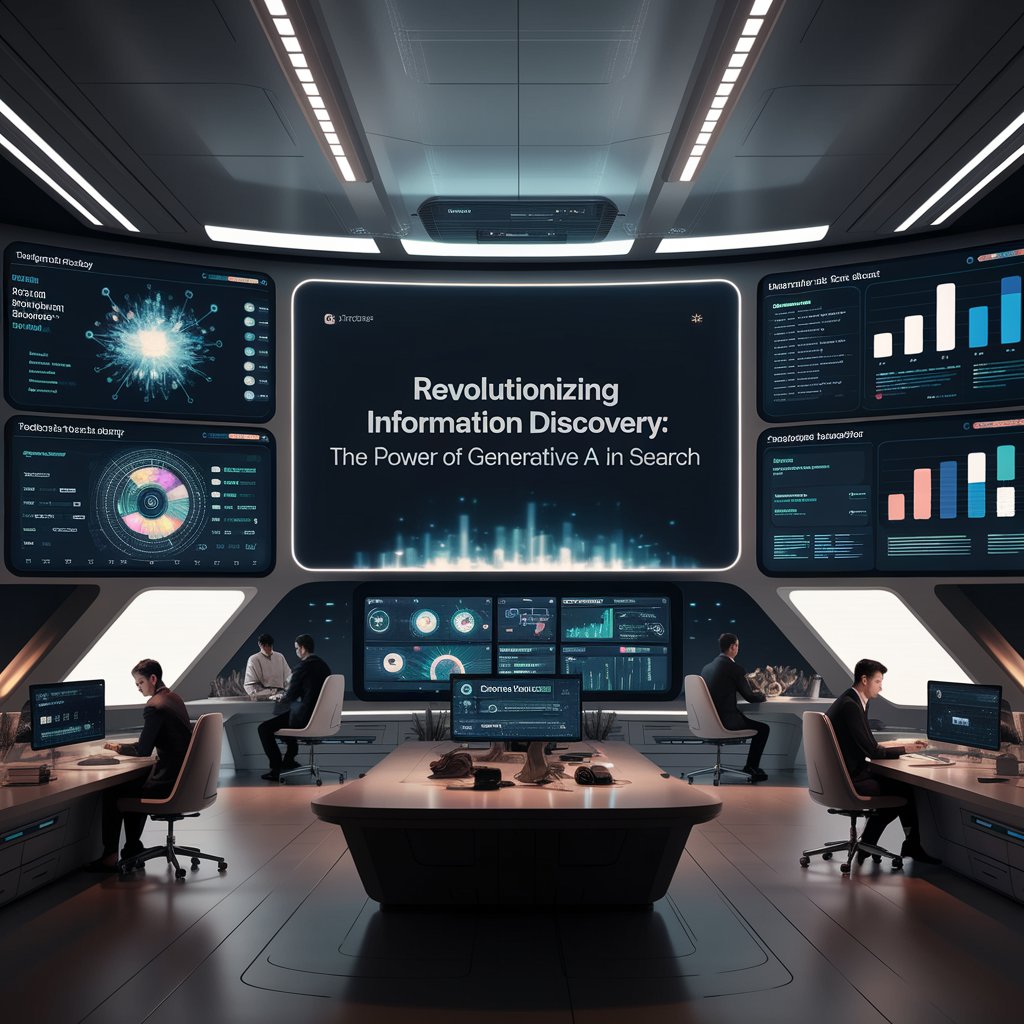In today’s fast-paced digital world, finding accurate information quickly has become more crucial than ever. Enter generative AI in search – a game-changing technology that’s transforming how we interact with search engines. This article dives deep into how AI, particularly Google’s innovations, is reshaping our search experience.
The Dawn of AI-Powered Search: What’s Changed?
The evolution of search engines has been nothing short of remarkable. From simple keyword matching to complex algorithms, search engines have come a long way. Now, with the integration of generative AI, we’re witnessing a paradigm shift in how information is retrieved and presented.
A Brief History of Search Engine Evolution
- 1990s: Basic keyword matching
- Early 2000s: PageRank and link analysis
- 2010s: Semantic search and natural language processing
- 2020s: AI-powered search and generative responses
The latest leap forward comes with the introduction of advanced capabilities in AI search. Google’s Gemini model, for instance, represents a significant advancement in this field.
“Generative AI in search isn’t just an improvement; it’s a revolution in how we access and process information.” – Dr. Fei-Fei Li, AI researcher
Introduction to Generative AI in Search
Generative AI goes beyond traditional search methods by not just finding information but also synthesizing and presenting it in a coherent, user-friendly manner. This technology, powered by models like Gemini, can understand context, interpret complex queries, and even generate new content based on the vast amount of data it has been trained on.
Key features of generative AI in search include:
- Natural language understanding
- Context-aware responses
- Multi-modal input processing
- Real-time information synthesis
These features culminate in what Google calls AI Overviews – concise, AI-generated summaries that provide quick answers to user queries.
Google’s AI Overview: Your Personal Search Assistant
AI Overviews represent a significant leap in search functionality. They act as a personal research assistant, quickly sifting through vast amounts of information to provide concise, relevant answers.
How AI Overviews Work
- Query Analysis: The AI interprets the user’s question, understanding intent and context.
- Information Gathering: It scours the web for relevant, up-to-date information.
- Synthesis: The AI compiles and summarizes the information.
- Presentation: A concise, coherent overview is presented to the user.
Types of Queries That Benefit Most from AI Summaries
| Query Type | Example | AI Overview Benefit |
|---|---|---|
| Factual | “What’s the population of Tokyo?” | Quick, accurate answer |
| Comparative | “iOS vs Android security” | Balanced, summarized comparison |
| Exploratory | “How does photosynthesis work?” | Concise explanation with key points |
| Current Events | “Latest developments in AI regulation” | Up-to-date summary of recent news |
Real-World Examples of Time-Saving Searches
- Meal Planning:
- Query: “Healthy meal plan for a week”
- AI Overview: Provides a balanced meal plan with recipes and nutritional information.
- Travel Research:
- Query: “Best time to visit Japan”
- AI Overview: Summarizes seasonal information, events, and traveler recommendations.
- Technical Troubleshooting:
- Query: “Why is my WiFi slow?”
- AI Overview: Offers a list of common causes and quick fixes.
Customizing Your AI Search Experience
One of the most powerful aspects of generative AI experiences in search is the ability to tailor the results to your specific needs. This customization ensures that the AI works for you, not the other way around.
Adjusting AI Overview Settings
Google’s Search Labs offers users the ability to fine-tune their AI search experience. Here’s how you can make the most of it:
- Detail Level: Choose between concise summaries or in-depth explanations.
- Source Preference: Prioritize academic, news, or general web sources.
- Language Style: Opt for formal or conversational tones in AI responses.
Balancing Between AI-Generated Content and Traditional Search Results
While AI Overviews are incredibly useful, they shouldn’t completely replace traditional search results. Here’s a guide to striking the right balance:
- Use AI Overviews for quick answers and general understanding
- Rely on traditional results for in-depth research and diverse perspectives
- Combine both for a comprehensive understanding of complex topics
Privacy Considerations in AI-Powered Search
As with any AI technology, privacy is a crucial concern. Google has implemented several measures to protect user data:
- Anonymization of search queries
- Option to turn off AI features
- Transparent data usage policies
Always review and understand the privacy settings when using AI-powered search features.
Tackling Complex Queries with AI
One of the most impressive capabilities of generative AI in search is its ability to handle complex questions. This is where the true power of models like Gemini shines through.
How AI Handles Multi-Faceted Questions
When faced with a complex query, the AI:
- Breaks down the question into component parts
- Searches for information relevant to each part
- Synthesizes the information into a coherent response
- Presents a comprehensive answer that addresses all aspects of the query
Comparison: AI vs. Traditional Search for Intricate Topics
| Aspect | Traditional Search | AI-Powered Search |
|---|---|---|
| Query Understanding | Keyword-based | Contextual and intent-based |
| Information Gathering | Displays multiple sources | Synthesizes from multiple sources |
| Result Presentation | List of links | Coherent summary with option to explore further |
| Handling Ambiguity | Often requires query refinement | Can ask for clarification or provide multiple interpretations |
Limitations and When to Rely on Human Expertise
While AI has made tremendous strides, it’s important to recognize its limitations:
- Lack of Real-Time Data: For very recent events, human-curated news sources may be more reliable.
- Ethical Decisions: In matters requiring moral judgment, human expertise is crucial.
- Creative Problem-Solving: For unique, unprecedented challenges, human ingenuity still reigns supreme.
“AI is an incredible tool, but it’s not a replacement for human judgment and expertise.” – Sundar Pichai, CEO of Google
Strategic Searching: Using AI to Plan Ahead
Generative AI isn’t just for immediate answers; it’s a powerful tool for long-term planning and research. Whether you’re planning a trip, a project, or a major life event, AI can help streamline the process.
AI-Assisted Research for Travel, Projects, and Events
- Travel Planning:
- AI can suggest itineraries based on your interests and budget
- It can provide up-to-date information on travel restrictions and local customs
- Project Management:
- AI can break down complex projects into manageable tasks
- It can suggest resources and tools for each stage of the project
- Event Planning:
- AI can help with vendor selection and price comparisons
- It can generate timelines and checklists for smooth event execution
Leveraging AI for Long-Term Information Gathering
- Set up AI-powered alerts for topics of interest
- Use AI to summarize and track developments in your field over time
- Employ AI to identify trends and patterns in large datasets
Case Study: Planning a Cross-Country Road Trip with AI Search
Let’s walk through how AI can assist in planning a complex trip:
- Route Planning:
- Query: “Best route for a cross-country US road trip”
- AI Response: Suggests multiple routes based on preferences (scenic, fastest, historic)
- Accommodation:
- Query: “Affordable hotels along I-95 with good reviews”
- AI Response: Provides a list of options with price ranges and key amenities
- Attractions:
- Query: “Must-see attractions between New York and Los Angeles”
- AI Response: Offers a curated list of attractions, categorized by type (natural, historical, cultural)
- Budget Planning:
- Query: “Estimated budget for 2-week US road trip”
- AI Response: Breaks down costs for fuel, food, accommodation, and attractions
By leveraging AI for each aspect of the trip, you can create a comprehensive, personalized travel plan with minimal effort.
Navigating the New AI-Organized Results Page
The integration of generative AI has led to significant changes in how search results are presented. The AI-organized results page is designed to provide a more intuitive and informative experience.
Understanding the Layout Changes
- AI Overview: Appears at the top, providing a quick summary
- Traditional Links: Follow the overview, now with AI-generated descriptions
- Related Questions: AI-generated queries to explore the topic further
- Multimedia Section: AI-curated images, videos, and infographics related to the search
How to Efficiently Scan AI-Curated Information
- Start with the AI Overview for a quick understanding
- Use the overview as a guide to dive deeper into specific aspects
- Pay attention to the AI-generated descriptions under each link for relevance
- Explore the related questions to broaden your understanding
Tips for Finding Source Material in the New Format
- Look for citation links within the AI Overview
- Use the “About this result” feature to understand why a particular source was chosen
- Utilize the advanced search tools to filter results by date, region, or content type
- Don’t hesitate to ask the AI for specific sources on a particular aspect of your query
Beyond Text: AI-Powered Video and Image Search
The concept of multimodality in AI search extends beyond text, encompassing video understanding and image analysis. This breakthrough allows for more comprehensive and diverse search experiences.
How AI Analyzes and Summarizes Video Content
- Speech Recognition: Transcribes spoken content
- Visual Analysis: Identifies objects, scenes, and actions
- Context Understanding: Interprets the overall theme and purpose of the video
- Summary Generation: Creates concise text summaries of video content
Using AI to Extract Information from Images
- Object and Scene Recognition: Identifies what’s in the image
- Text Extraction: Reads and interprets any text within the image
- Color and Style Analysis: Useful for design and art-related queries
- Facial Recognition: Identifies public figures (with privacy considerations)
Ethical Considerations in AI-Powered Visual Search
- Privacy Concerns: Ensuring that facial recognition is used responsibly
- Copyright Issues: Respecting intellectual property rights in image and video content
- Bias Mitigation: Addressing potential biases in visual recognition algorithms
- Transparency: Clearly indicating when AI has been used to analyze visual content
The Future of AI in Search
As we look ahead, the potential of generative AI in search seems boundless. The continuous development of models like Gemini promises even more advanced capabilities in the near future.
Upcoming Features and Improvements
- Enhanced Natural Language Understanding: Even more nuanced interpretation of complex queries
- Improved Multimodal Integration: Seamless combination of text, image, and video inputs
- Real-Time Information Processing: Up-to-the-minute accurate responses
- Personalized AI Models: Tailored search experiences based on individual user patterns
Potential Impacts on Information Accessibility
- Democratization of Knowledge: Making complex information more accessible to the general public
- Breaking Language Barriers: Real-time translation and summarization of content in any language
- Assistive Technology: Enhancing information access for individuals with disabilities
Preparing for a World Where AI is the Primary Search Interface
- Develop critical thinking skills to evaluate AI-generated content
- Stay informed about AI advancements and their implications
- Embrace lifelong learning to adapt to rapidly changing technology
- Advocate for ethical AI development and usage
As we embrace the era of generative AI in search, we’re not just changing how we find information – we’re transforming our relationship with knowledge itself. The future of search is intelligent, intuitive, and incredibly powerful. By understanding and leveraging these advancements, we can unlock new levels of efficiency and insight in our quest for information.
FAQs
What is Generative AI in Search?
AI technology that finds, synthesizes, and presents information in a user-friendly manner, understanding context and interpreting complex queries.
How does Google's AI Overview work?
It analyzes queries, gathers relevant info, and presents a concise summary to answer questions quickly.
What queries benefit most from AI Overviews?
Factual, comparative, exploratory, and current events queries.












